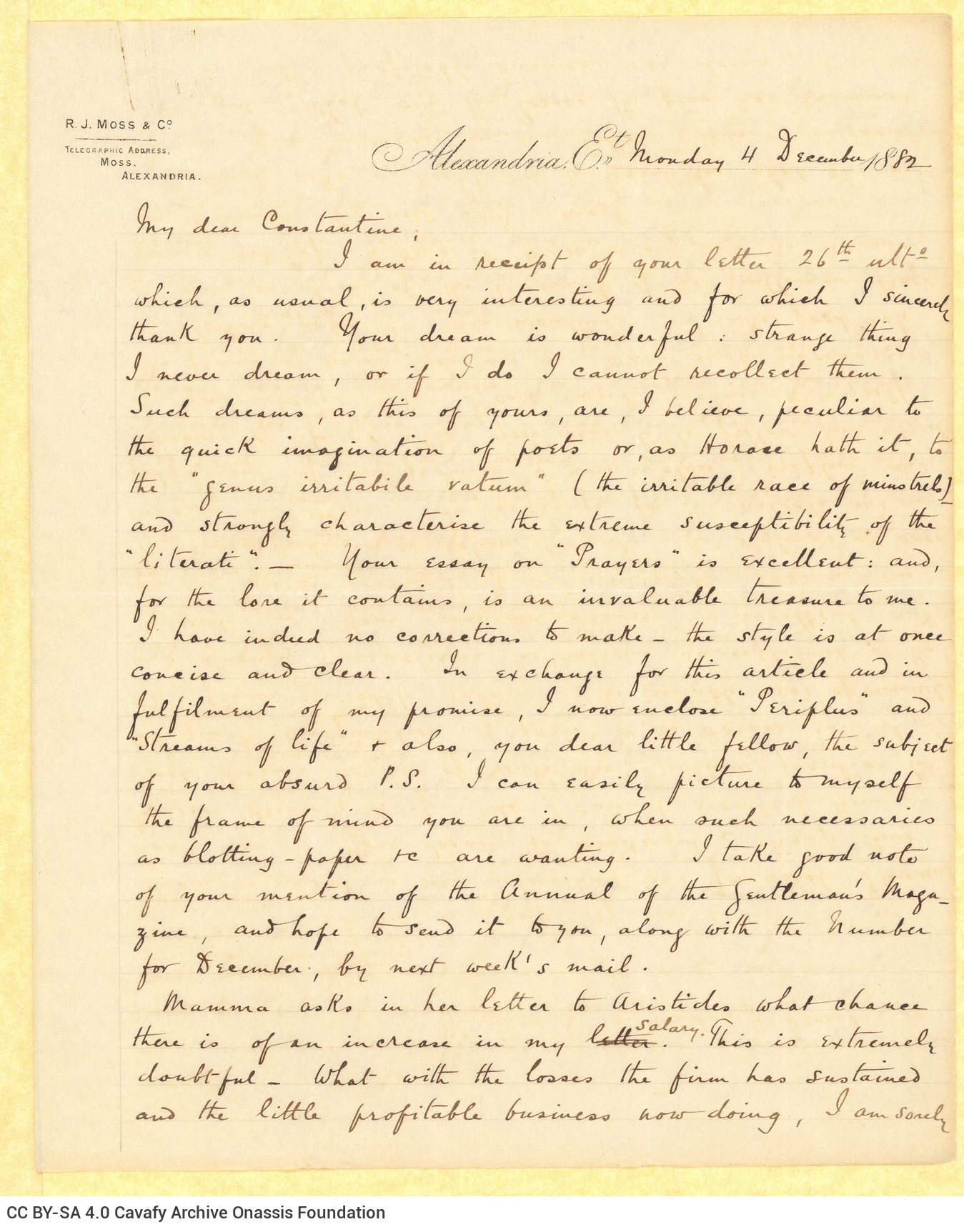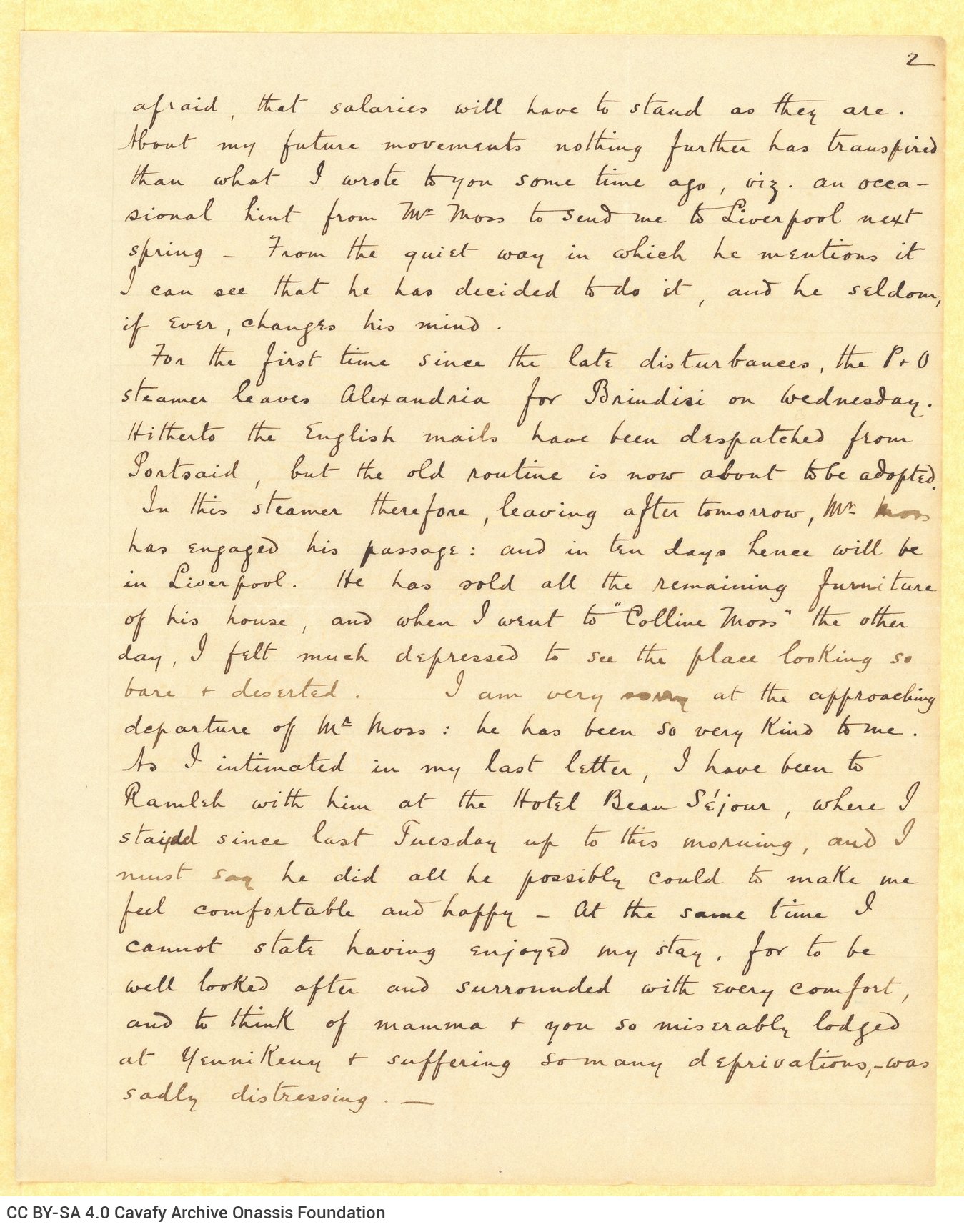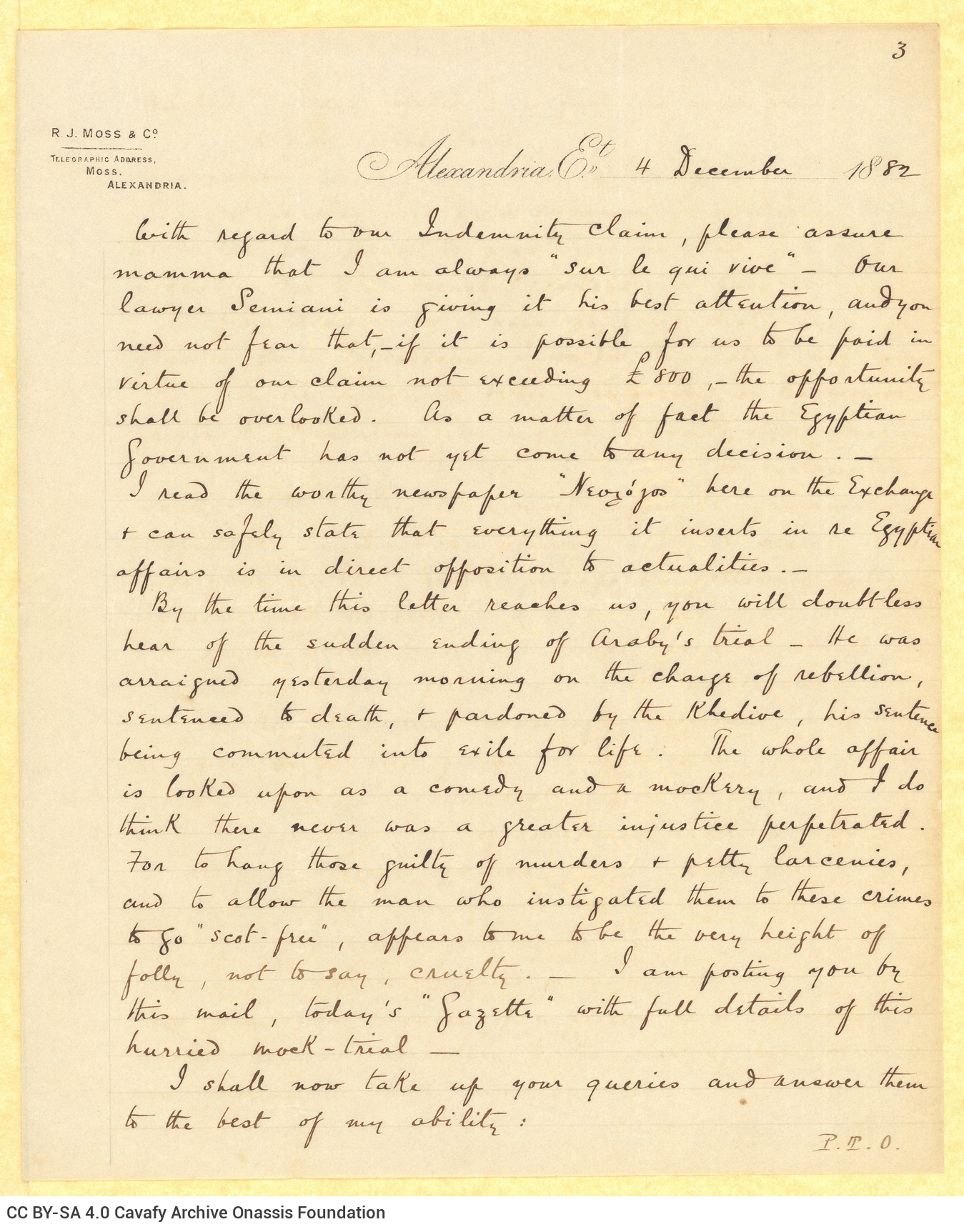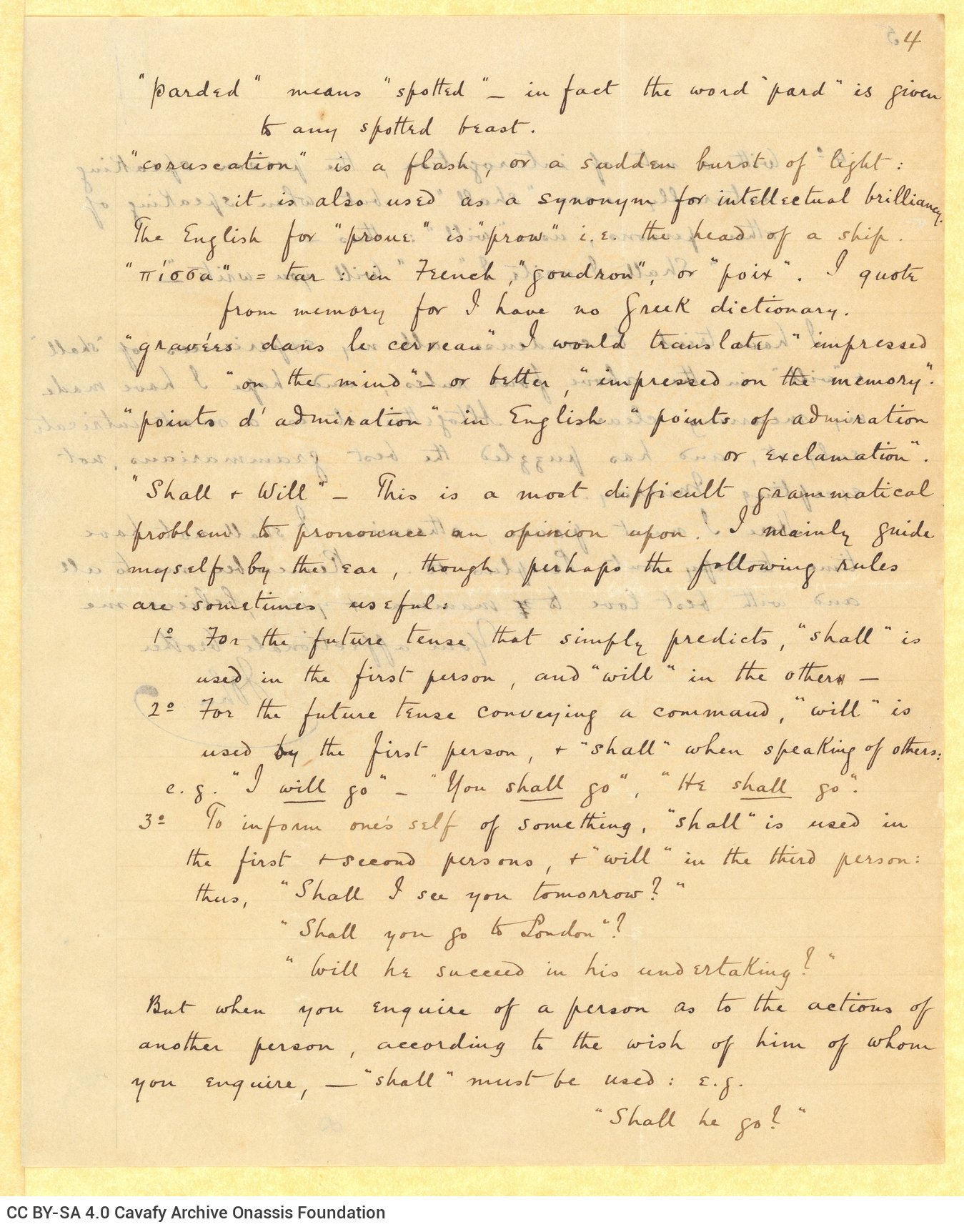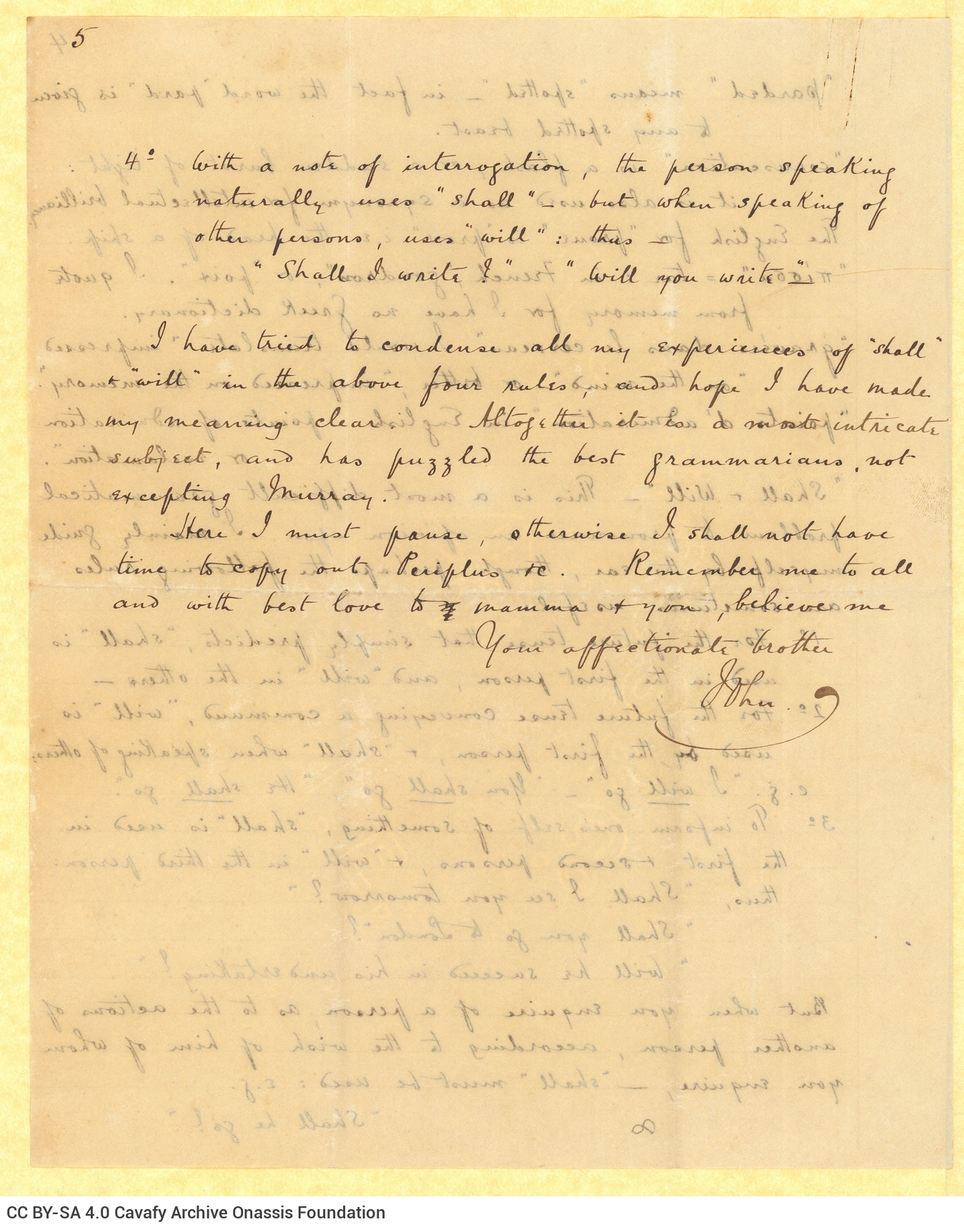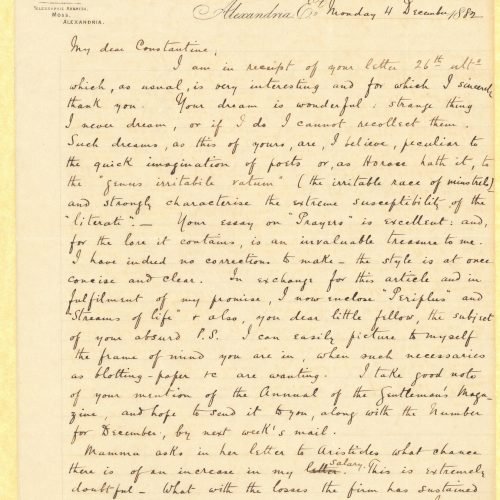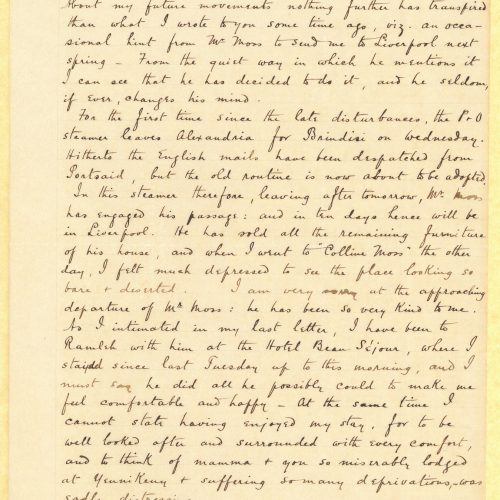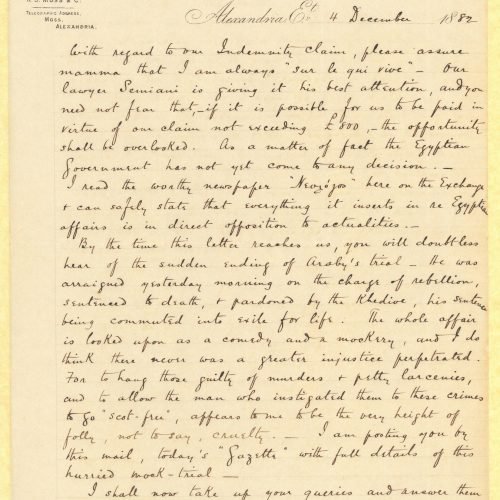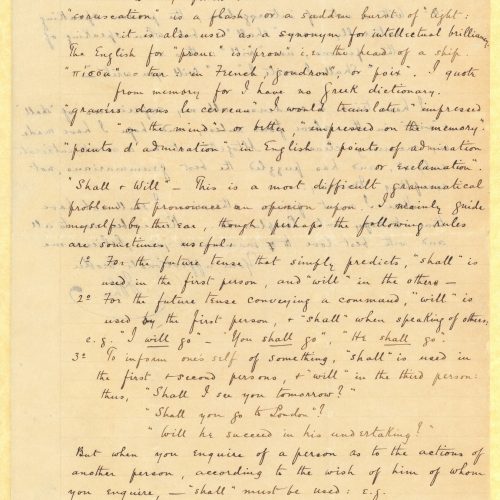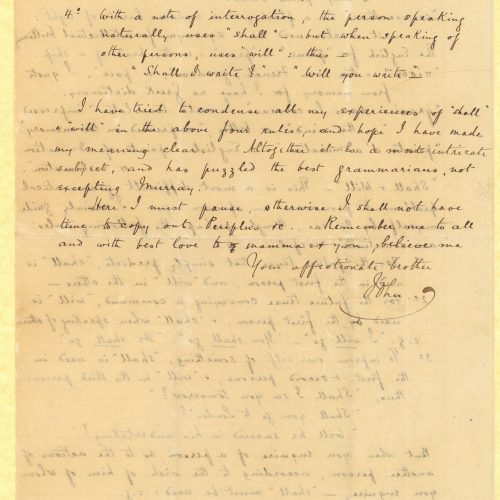Letter by John Cavafy to C. P. Cavafy
[Alexandria] Monday 4 December 1882
My dear Constantine,
I am in receipt of your letter 26th ultimo which, as usual, is very interesting and for which I sincerely thank you. Your dream is wonderful: strange thing I never dream, or if I do I cannot recollect them. Such dreams, as this of yours, are, I believe, peculiar to the quick imagination of poets or, as Horace hath it, to the “genus irritabile vatum” (the irritable race of minstrels) and strongly characterise the extreme susceptibility of the “literati”. ― Your essay on “Prayers” is excellent: and, for the lore it contains, is an invaluable treasure to me. I have indeed no corrections to make ― the style is at once concise and clear. In exchange for this article and in fulfilment of my promise, I now enclose “Periplus” and “Streams of life” and also, you dear little fellow, the subject of your absurd postscript I can easily picture to myself the frame of mind you are in, when such necessaries as blotting-paper etc. are wanting. I take good note of your mention of the Annual of the Gentleman’s Magazine, and hope to send it to you, along with the Number for December, by next week’s mail.
Mamma asks in her letter to Aristides what chance there is of an increase in my salary. This is extremely doubtful ― What with the losses the firm has sustained and the little profitable business now doing, I am sorelyafraid, that salaries will have to stand as they are. About my future movements nothing further has transpired than what I wrote to you some time ago, viz. an occasional hint from Mr. Moss to send me to Liverpool next spring ― From the quiet way in which he mentions it I can see that he has decided to do it, and he seldom, if ever, changes his mind.
For the first time since the late disturbances, the Peninsular and Oriental steamer leaves Alexandria for Brindisi on Wednesday. Hitherto the English mails have been despatched from Portsaid, but the old routine is now about to be adopted.
In this steamer therefore, leaving after tomorrow, Mr. Moss has engaged his passage: and in ten days hence will be in Liverpool. He has sold all the remaining furniture of his house, and when I went to “Colline Moss” the other day, I felt much depressed to see the place looking so bare and deserted. I am very sorry at the approaching departure of Mr. Moss: he has been so very kind to me. As I intimated in my last letter, I have been to Ramleh with him at the Hotel Beau Séjour, where I stayed since last Tuesday up to this morning, and I must say he did all he possibly could to make me feel comfortable and happy ― At the same time I cannot state having enjoyed my stay, for to be well looked after and surrounded with every comfort, and to think of mamma and you so miserably lodged at Yeunikeuy and suffering so many deprivations, ― was sadly distressing. ―With regard to our Indemnity claim, please assure mamma that I am always “sur le qui vive” ― Our lawyer Semiani is giving it his best attention, and you need not fear that, ― if it is possible for us to be payed in virtue of our claim not exceeding £ 800, ― the opportunity shall be overlooked. As a matter of fact the Egyptian Government has not yet come to any decision. ―
I read the worthy newspaper Νεολόγος here on the Exchange and I can safely state that everything it inserts in re. Egyptian affairs is in direct opposition to actualities. ―
By the time this letter reaches us, you will doubtless hear of the sudden ending of Araby’s trial ― He was arraigned yesterday morning on the charge of rebellion, sentenced to death, and pardoned by the Khedive, his sentence being commuted into exile for life. The whole affair is looked upon as a comedy and a mockery, and I do think there never was a greater injustice perpetrated. For to hang those guilty of murders and petty larcenies, and to allow the man who instigated them to these crimes to go “scot-free”, appears to me to be the very height of folly, not to say, cruelty. ― I am posting you by this mail, today’s Gazette with full details of this hurried mock-trial ―
I shall now take up your queries and answer them to the best of my ability:“parded” means “spotted” ― in fact the word “pard” is given to any spotted beast.
“coruscation” is a flash, or a sudden burst of light: it is also used as a synonym for intellectual brilliance.
The English for “proue” is “prow” i.e. the head of a ship.
“πίσσα” = tar: in French, “goudron”, or “poix”. I quote from memory for I have no Greek dictionary.
“gravées dans le cerveau” I would translate “impressed on the mind” ― or better, “impressed on the memory”.
“points d’admiration” in English “points of admiration” or, “exclamation”.
“Shall and Will” ― This is a most difficult grammatical problem to pronounce an opinion upon. I mainly guide myself by the ear, though perhaps the following rules are sometimes useful.
1o For the future tense that simply predicts, “shall” is used in the first person, and “will” in the other ―
2o For the future tense conveying a command, “will” is used by the first person, and “shall” when speaking of others: e.g. “I will go” ― “You shall go”, “He shall go”.
3o To inform one’s self of something, “shall” is used in the first and second persons, and “will” in the third person: thus, “Shall I see you tomorrow?”
“Shall you go to London”?
“Will he succeed in his undertaking?”
But when you enquire of a person as to the actions of another person, according to the wish of him of whom you enquire, ― “shall” must be used: e.g. “Shall he go?”4o With a note of interrogation, the person speaking naturally uses “shall” ― but when speaking of other persons, uses “will”: thus ―
“Shall I write?” “Will you write” ―
I have tried to condense all my experiences of “shall” and “will” in the above four rules, and hope I have made my meaning clear. Altogether it is a most intricate subject, and has puzzled the best grammarians, not excepting Murrey.
Here I must pause, otherwise I shall not have time to copy out «Periplus» etc. Remember me to all and with best love to mamma and you, believe me
Your affectionate brother
John
DIGITAL OBJECT DESCRIPTION
IDENTITY AREA
44 x 27.5 cm
CONTEXT AREA
CONTENT AND STRUCTURE AREA
Handwritten letter by John Cavafy to C. P. Cavafy, on two double sheet letterheads of R. J. Moss & Co., Alexandria. Pages 2-5 are numbered. The author refers to his financial state and to that of his brother’s Aristeidis, to his professional prospects as well as to the issue of indemnity for the destruction of the family’s assets in Alexandria. Update on the political developments in Egypt. Linguistic remarks on the proper use and meaning of specific words and phrases in English.
CONDITIONS OF ACCESS AND USE AREA
English
Writing in ink. Watermark: R. J. Moss & Co Alexandria. Physical item wear: oxidations.
NOTES AREA
The transcription and editing of the letters of John Constantine Cavafy addressed to C. P. Cavafy was first carried out by Katerina Ghika; said transcriptions were subsequently uploaded to the official website of the Cavafy Archive.
